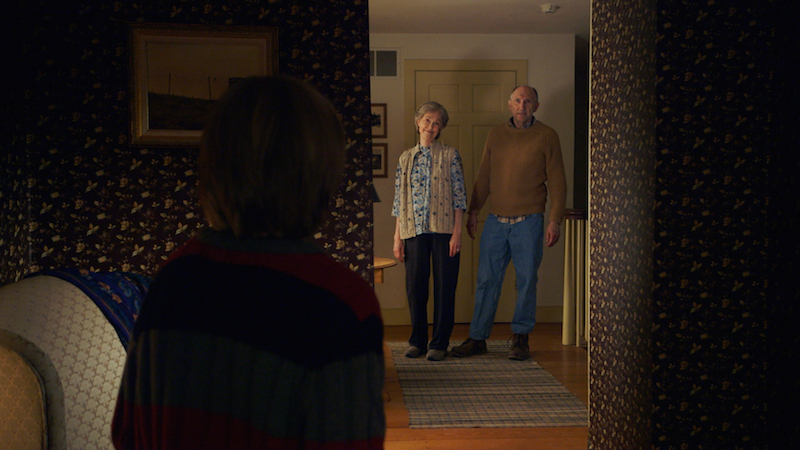
M. Night Shyamalan is known for many things—his Hitchcockian ego (without the commensurate Hitchockian talent), his penchant for twists, his burdensome early success—but his puckish sense of humor is certainly not one of them. Imagine then, my surprise to discover that The Visit, while being quite scary, is really a hip and loose-limbed comedy at heart—and a damn good one at that.
Shyamalan takes something very inherent in American culture—our irrational fear of old people (who among us didn’t have that one scary house in the neighborhood which harbored a mysterious, creepy, and possibly homicidal old person?)—and puts it to good use.
Our heroes are a couple of young teens—aspiring filmmaker Becca (Olivia DeJonge) and her rapping kid brother Tyler (Ed Oxenbould), aka T Diamond Stylus. The whole family was shaken up, several years back, when their father left them abruptly—leaving Tyler germaphobic and susceptible to panic attacks, Becca so insecure she’s unable to look in a mirror, and their mother (Kathryn Hahn, great as usual) prone to melancholy. The trip, then, to finally meet Nana (Deanna Dunagan) and Pop Pop (Peter McRobbie)—from whom their mother is estranged—seems just what the doctor ordered. It’ll give Mom a chance to take a vacation with her new beau, and it’ll give Becca a chance to not only make a documentary about her vacation but possibly mend her mother’s fractured relationship with her parents.
At first, everything seems to be going swimmingly. Nana and Pop Pop, who live on a big, rambling farm, are almost idealized grandparents: Nana likes to bake; Pop Pop chops wood and tinkers in the shed. But, little by little, things seem to get strange: What are those mysterious banging noises at night? What actually is Pop Pop doing in the shed? What’s up with that strict 9:30 curfew? And why does Nana insist that Becca climb all the way into the oven to clean it?
Shyamalan plays all of this for goosey laughs, first teasing our expectation of what will happen, and then delivering the goods. I will say that he can’t seem to abandon all of his old habits (you’ll know what I mean once you see the film) and some of the jokes about old people—yes, there’s an ongoing Depends bit—border on mean-spirited. It’s hard to say: Is Shyamalan merely appropriating our culture’s ageism, or is he guilty of it himself?.
Regardless, Dunagen and McRobbie are excellent as the warm-turned-creepy grandparents, especially Dunagen, who gives good crazy. But the real finds here are the child stars, who are just remarkable. DeJonge’s Becca is a wonderful heroine—smart, inquisitive, brave. And Oxenbould is hilarious as the rhyme-spewing Tyler—his comic timing would rival any Borscht Belt veteran.
There are so many great bits, I don’t want to give them away—but suffice it to say, Tyler’s decision to substitute profanity with the names of female pop stars is the gift that keeps on giving; as is Tyler’s and Becca’s “quick, look natural” game of ball in the yard they play while hatching schemes.
There’s a lesson to be learned here: With all of Shyamalan’s many ponderous, self-serious horror films, he’d become a bit of a cultural joke. Here, he loosened up, shed some of his ego, and reminded all of us what a gifted writer and director he truly is.
